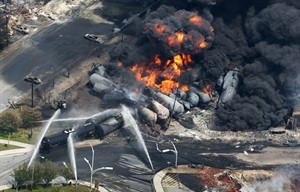Elevate your local knowledge
Sign up for the iNFOnews newsletter today!

TORONTO – Three employees and a railway company involved in last summer’s massive explosion of a runaway oil train that incinerated much of a small town in Quebec, killing 47 people, will face criminal negligence charges, prosecutors announced late Monday.
More than 60 oil tankers derailed in the downtown district of Lac Megantic, Quebec, last July 6.
The Quebec provincial prosecutor’s office said that 47 counts of criminal negligence have been filed against engineer Thomas Harding, manager of train operations Jean Demaitre, and Richard Labrie, who was in charge of rail circulation, as well as the Montreal, Maine and Atlantic Railway Ltd., the defunct railway at the heart of the disaster.
Rene Verret, a spokesman for the prosecutor, said the three railway employees were placed under arrest late Monday afternoon. They are scheduled to appear in court on Tuesday in Lac Megantic.
The charges come about 10 months after more than 60 of the tankers carrying oil from North Dakota came loose in the middle of the night, sped downhill for nearly seven miles (11 kilometres) and derailed in the town of Lac-Megantic in eastern Quebec. At least five of the tankers exploded, levelling about 30 buildings, including a popular bar that was filled with revelers.
Want to share your thoughts, add context, or connect with others in your community?
You must be logged in to post a comment.